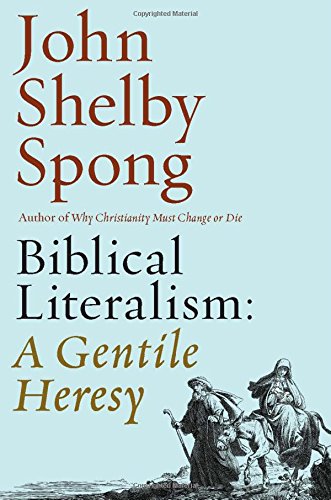Security sells.
That’s why, says retired Episcopal Bishop John Shelby Spong, despite his best-selling controversial books and popular speeches, his position on Jesus and the Christian church will never be the majority opinion, because he believes Jesus is not the Savior of the world and that the Bible cannot be read literally.
That hunger for security is being sated by everyone from mega-church pastors offering assurances that Jesus will save the faithful, to the current crop of presidential candidates hawking their ability to keep us safe.
“Donald Trump can say the outrageous things he says because it speaks to people’s fears,” Spong said in a recent interview with RD’s Candace Chellew-Hodge. “They respond because he says what their fears want to hear. He can’t deliver any more than anyone else can.”
But that doesn’t keep him, or any of the other candidates or pastors from promising that security, whether it’s offered through God, guns or the government.
How did we get into such as sorry state? Gentiles, Spong says.

Biblical Literalism: A Gentile Heresy
John Shelby Spong
HarperOne
February 16, 2016
What is there, however, is a powerful message that runs counter to the idea that faith offers nothing but a sweet and secure life. Instead, the biblical writers are inviting readers into the mystery of a life that is frequently messy and often downright brutal.
That, Spong says, is the real Good News.
Candace Chellew-Hodge: You say in this book that reading the Bible literally is a Gentile heresy. What does that mean?
John Shelby Spong: It means that the gospels, and especially Matthew [is written by] a Jewish disciple of Jesus, part of a congregation of Jewish disciples of Jesus. [Matthew] assumes certain things that Jews can assume about their common life, their common heritage and scriptures and their common ability to tell stories. He doesn’t have to explain that. Then, by the year 150 or thereabouts, there were so few Jews left in the Christian church that Marcion wanted to remove any semblance of Judaism from the Christian scripture. The church officially resisted that, but unofficially they became quite anti-Semitic. What happens then, you have an audience of only Gentiles reading these Jewish stories and because they don’t understand the storytelling background they have to assume that the stories are literal.
“We imposed fundamentalism on the Bible. No one who has ever read the Bible could be a literalist.”
The literalization of the Gospels is not the result of the authors, it’s the result of a generation 150 years after the birth of Jesus who didn’t know the Jewish tradition so they couldn’t see these connections. They didn’t know, for example, that the feeding of the 5,000 was not a miracle. It was a retelling of Moses’ manna in the wilderness story heightened and applied to Jesus. That’s a very different perspective so the Jews never argued about whether Jesus actually fed all those people with five loaves and two fish. But, if you see it as a familiar story in the Jewish tradition where the food supply is expanded in the Moses story, and in the stories of Elijah and Elisha, then you can retell it about Jesus and magnify it.
In addition, Jesus’ ascension into heaven is not an astronomical wonder, it’s the story of Elijah magnified and retold about Jesus. When Elijah ascends into heaven he sends a double portion of his human spirit onto his human disciple. When Jesus ascends into heaven he sends the infinite power of God’s holy spirit on the whole gathered community sufficient to last through all of time.
You’ve got to see the connections between these stories before they make sense. It gives you an alternative to biblical fundamentalism. That’s not original to the text. We imposed fundamentalism on the Bible. No one who has ever read the Bible could be a literalist.
When you’ve grown up in a tradition of literal biblical interpretation, like I did in the Southern Baptist church, your words can be very challenging. You debunk deeply held literal beliefs by asserting that the star of Bethlehem wasn’t real, the Lord’s prayer is a creation of the church and was never uttered by Jesus. If all of these symbols that we have taken literally can’t be read that way, how do we make new meaning?
That’s the hard part. The reason why is that you now have to talk about the Jesus experience in the light of whatever contemporary knowledge we have. We can’t just pretend it’s not there. So, I say to people, “Do you know what a star is? It’s burning masses of gas at incredible temperatures and formed out of all sorts of dust and matter over millions of years. A star does not give a message about some event that happened on earth.”
When you say that, they say, “Well, of course not.” Then you ask, “How many of you have known about a star that traveled across the sky so slowly that wise men could keep up with it? Was it equipped with a GPS system? But then it failed because it led them to Herod, to the palace of the king. It didn’t lead them to the child.”
Once you say that, they say, “I never thought about that.”
They can [then] say that if it’s not true then their whole religious faith is not true, or they can say, “This story was a first-century way that Jews learned to describe something that was incredibly true to them and I need to get out from under their explanation to understand what the substance was,” and that’s the place where you begin to lead them into a new possibility.
“I think the church is the only place we’ve got, but we’ve got to transform and redeem it.”
I happen to know the Bible pretty deeply and I didn’t reject the Bible when I rejected its literal frame of reference. I happen to be a believing, practicing Christian. I don’t go to church on Sunday mornings for show. I go because I want to be there and I need to worship. It’s not an option for me to sleep in on Sunday. My faith is deeper than that. I do not eat a meal that I don’t stop and say grace beforehand because that’s how I acknowledge the presence of God in my life at a regular time. I try to live a life of absolute commitment. I claim my Christian identity publicly.
This puts me at odds with my colleagues in the Jesus Seminar who are so scholarly but they are not devoted. They really think the church is a sick institution and they don’t want to be part of it. I think the church is the only place we’ve got, but we’ve got to transform and redeem it. If the church is not going to be the place where people encounter God and Christ I don’t see any other place in our society to do so. I work to transform the church. I don’t work to get rid of the church. I work to transform the meaning of what it means to be a Christian, not to get rid of that meaning.
In this book, you chose to explore only the gospel of Matthew, which you say, along with the other synoptic gospels of Mark and Luke, is really a liturgical writing that was used by the original followers of Jesus. Explain what that means.
I chose Matthew because, for some reason, the church put Matthew first in the New Testament. I think they actually thought it was the first gospel written and they probably thought Mark was a Reader’s Digest condensation of Matthew. We now know that Matthew copied about 90% of Mark. Mark was beginning to move away from Judaism into the Mediterranean world. It was probably written in Rome. Matthew draws Mark back more into the Jewish orbit.
If you analyze Mark carefully, you know that the crucifixion story is told against the Passover. That’s a clue to seeing the whole story as told against the Jewish liturgical year. If you understand that’s where Mark’s climax is and you roll Mark backwards to the opening, he opens with a story appropriate to Rosh Hashanah. Mark writes a Jesus narrative to carry the Jewish Christians from Rosh Hashanah to Passover. The reason Matthew wanted to expand Mark was that he wanted Jesus stories for the whole year so he has another five and a half months to cover.
One of the crucial insights is that because Matthew can’t hold off the baptism of Jesus until Rosh Hashanah where Mark introduces it, he has to do it at the beginning of Jesus’ ministry because he can’t tell his story if he doesn’t do that. When he gets back to Rosh Hashanah he does a flashback and brings John the Baptist out of prison—not in person but in terms of messengers—to inquire about whether Jesus is the Messiah. Jesus responds with a quotation from Isaiah 35 which says you will see the kingdom of God breaking into human history when the blind receive their sight and the deaf receive their hearing and lame can leap and the mute can sing.
“…the opposite of not being literal is not that it’s not true. The opposite of literal is to be interpretive.”
Before he tells that story he wraps all the healing stories where Jesus does these things so that when Jesus proclaims these are the things that are happening and this means the Kingdom of God is coming in, then John the Baptist can still be the forerunner announcing that the Kingdom of God is at hand.
That’s why Matthew is 40% longer than Mark because he goes through the whole year.
That’s the first clue I received from my mentor Michael Gouder who saw that Mark wrote his gospel with Jesus stories to carry the community from Rosh Hashanah to Passover, then he began to look at the Jewish festivals that fall between those two and see if he could find appropriate Jesus stories for them and there are three.
There’s Yom Kippur, which comes ten days after Rosh Hashanah. Then there’s Sukkoth, which comes fifteen to twenty-two days afterward. Then there’s Dedication, or what we call Hanukkah. Then he looked at Mark and found very appropriate Jesus stories for the Yom Kippur, for Sukkoth and for Dedication which is the return of the light of God to the temple at the time of the Maccabees.
Those are healing/cleansing stories and Jesus going into that which is evil and pulling evil out and turning it into good. It’s best told in the story where he goes into the place where they collected taxes for the Gentile oppressors and pulled a Jewish guy named Levi away from the receipt of custom back into discipleship, that’s what Yom Kippur is all about. You bring good out of evil. That’s immediately followed with all the harvest parables—the sower, the mustard seed, the wheat and the tares—all come in the harvest season of Sukkoth. Then, the transfiguration story where the light of God does not return to the temple because it has been destroyed by the Romans. The light of God returns to Jesus who is being put forward by the Christians as the new temple… the new meeting place between God and human life. So, the transfiguration story is the Christian version of Hanukkah.
Once you get that framework in Mark’s gospel, Rosh Hashanah to Passover, then you can begin to see it in Matthew and in Luke. It’s very different because Matthew is very Jewish and Luke is very Gentile-oriented. Luke tells a different sort of story, but you can still recognize the liturgical year.
How am I going to get people to understand this without giving them this tedious background? I don’t know!
That is an interesting problem. You’re talking about a great revelation that opens the Bible in so many ways and opens people’s eyes to new ways of thinking and considering God. I see the lure of reading it literally because it makes everything a slogan and a bumper sticker.
It’s like you pull shades from people’s eyes and they say, “Ah, I never thought of that.” I was recently in Milwaukee and I took the shadow of Moses and lifted it out of Matthew’s gospel, starting with the murder of the children by Herod, which is a Moses story now being wrapped around Jesus. Then to the baptism which tells the Red Sea story, then Jesus goes into the wilderness for forty days because Moses went into the wilderness for forty years. Then the temptations of Jesus are patterned after the trials of Moses in the wilderness and then when he gets through [Matthew] puts Jesus on a new mountain to give a new interpretation of the law and that’s the Sermon on the Mount.
You’ve got all of these Moses stories and they make such an incredible pattern that people can understand, and they know this is not literal. But, the opposite of not being literal is not that it’s not true. The opposite of literal is to be interpretive. If you can bring people into an interpretive view of the New Testament instead of a literal view then you don’t have to be a fundamentalist. People are fundamentalist because they don’t know there’s any other possibility.
The other thing is you can then be a believer with integrity because what you’re reading is a Jewish portrait painted for a Jewish audience filled with profound insights into the nature of God and into the meaning of Jesus as an expression of the nature of God and you can hear it without being forced to think that maybe the reason that Jesus and God are related is because God had an affair with a Jewish girl on a Galilean hillside and produced the Godman. That’s what you get if you literalize the story.
I don’t mean to be profane about that but sometimes you have to make it sound as ridiculous as this so people know you can’t read the story literally.
What did you most enjoy about writing this book?
The most fun I had in the first part of the book was developing the characters that Matthew puts into the genealogy—the tainted women. That’s not an accident. Nobody reads the genealogy. That’s the most boring part of the Bible and yet the clue to the virgin birth is in that story. God can raise up holiness out of any human distortion is what that says. So, a virgin birth is no big deal.
When you view it that way it stops being a tenet of belief that you must believe in order to be Christian.
“Galileo rendered God homeless and Isaac Newton rendered God unemployed so wherever we thought God was and whatever we thought God did, we can no longer think that way.”
Which would rule out both Paul and Mark, who had never heard of the virgin birth, and John, who clearly had heard of it but omits it. That’s just biblical knowledge most people don’t have. I wrote a book once about reclaiming the Bible for a nonreligious world. I really want to take it back from those people who I think are ruining it. I don’t dislike those people. My mother was a fundamentalist. She had not finished the 9th grade. She knew no other way to approach the biblical story. But, for those who do know there’s another possibility, they don’t have to be either a fundamentalist or a secular drop-out.
I’ve heard you say before that the exodus from religion, especially by millennials, is happening because we’re 21st-century people still trying to hold 4th-century beliefs.
Back then it was clear that God was above the sky and could look down and see all of your misbehavior and put it in the Book of Life and make you face it at the time of your judgment. There’s enormous behavior control operating.
Galileo rendered God homeless and Isaac Newton rendered God unemployed so wherever we thought God was and whatever we thought God did, we can no longer think that way. To say nothing of moving on to Charles Darwin when we used to think we were a little lower than the angels and now we have to face the fact we’re a little higher than the apes and that’s a very different perspective for people.
What you’re asking people to do is what the fundamentalist churches are not asking them to do, which is to think deeply about their faith and its basis. How do you get people to that point?
You have to be controversial. I don’t like being controversial. I get abused a lot in mail, phone calls and that sort of thing. I don’t enjoy that. But, if you are controversial in the public arena, the people who have given up on Christianity say, “My God, there must be something more to this story than I realized.” So, being controversial is my doorway to the generation of my own children.
“The primary issue in the Christian church today is to get away from original sin and to see the story of Jesus not as saving the sinful but as expanding their humanity.”
Most of my controversy came from my fight for the rights of gays and lesbians. Once I was convinced of the holiness of gays and lesbians, I ordained the first openly gay man with a partner in 1989. That’s a long time ago in this battle. It was covered by all the major networks and print media. We had picketers outside. I was inundated with hate mail and when I visited churches I was spat on as I entered. It’s never fun but that’s the doorway, [how] you get the non-Christian world, those who have given up on Christ and God and the church—that’s the way you get them to notice that there must be something more to the story or this bishop is crazy.
So, by being controversial, have you had people tell you that your books or speeches have brought them back to Christianity?
Time after time. I write a weekly column and I get enormous mail and you can’t believe the number of mails I get from people living in little towns and there’s no church they can or want to go to so I am their church. I am the one point of contact outside of that community that makes them know they’re not crazy, because everybody else thinks they must be a Communist if they don’t go to church.
I get letters from people who say they after they read one of my earlier books they burned it because it was so evil. Then, ten years later, they come back and say, “Now, I really understand what you’re talking about and now you’re speaking to me.” I really appreciate that.
Writing is a strange gift. You put it out into the void and you really have no idea how people will respond to it except by the mail you get.
Speaking again as a recovering Southern Baptist, I was taught that our job was to go out into the world and convert people to my religion. And yet, in the book, you say the whole basis of that “evangelical” bent of many Christian churches, the “Great Commission” in Matthew, wasn’t an order to convert the world to our religion. What does it really mean?
It means you have to go beyond the boundaries of your own security system based on your own fears. It means you have to go to those you have classified as unclean or unsaved and you’ve got to tell them that the love of God is available to them, too, that the Gospel is not exclusive.
It’s the other half of the wise man story. Matthew wraps his gospel in what I call an envelope: the Christ is born, the world announces it with a star and he draws the Gentiles into the worship of this Christ child at the end of the story. This Christ, now resurrected, says that your task is to take the light of the love of God and give it to everybody in the world, even those you denigrate. This word needs to go beyond the boundaries of your religion, beyond your dietary laws and thinking all Gentiles are unclean.
But when your agenda is to convert someone to your way of thinking, it’s hostile. You’re saying, “My faith is better than your faith, which means I’m better than you, and if you don’t accept my faith there’s something wrong with you.” That’s hostile and you can’t communicate the love of God through hostility. That’s what we’ve got to break open.
The love of God can never be communicated with human hostility. What we’re to preach in the world is not conversion. It’s to preach the Gospel, which is the infinite love of God for all that God has made. That’s a very different gospel than what I hear going on in places that believe you have to convert or you’re going to fry in hell. I think I’d rather fry in hell than spend an eternity with people who think that way.
The primary issue in the Christian church today is to get away from original sin and to see the story of Jesus not as saving the sinful but as expanding their humanity. I look out not on original sinners but on incomplete human beings yearning to be made whole and that’s what the gospel is all about. It’s not about saving sinners.
Do you think your view of Christianity will become the majority view at some point?
No, and that doesn’t worry me, because every image in the Bible is a minority image. The Christian church is to be the yeast in the bread, the light in the darkness, the salt in the soup. It’s never supposed to be Christendom running the world. We are to give a flavor to life. We’re remnant people walking into the mystery of God and we have to walk faithfully.





